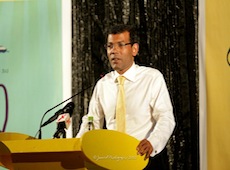Imports in the first ten months of 2012 increased by 18 percent compared to the same period last year, the Maldives Customs Service (MCS) has revealed.
In a press release on Thursday, MCS explained that while goods worth MVR 16.25 billion (US$1 billion) were imported in the first ten months of 2011, the figure as of the end of October 2012 was MVR 19.22 billion (US$1.2 billion).
However, as a result of import duty reductions approved by parliament in late 2011, income from import duties decreased by 50 percent compared to the same period in 2011.
“While MVR 2.09 billion (US$135.5 million) was received as import duties by October last year, import duties received in the same period this year was MVR 1.05 billion (US$68 million),” the press release stated.
As of January 1, 2012, it added, import duties were completely eliminated for some items while it was substantially reduced for other goods.
MCS has also collected MVR 40.5 million (US$2.6 million) as fines for import duty fraud and evasions and other fees so far this year.
As of October 2012, the highest volume of imports to the country came from United Arab Emirates with goods worth MVR 5.71 billion (US$370 million), followed by Singapore with goods worth MVR 3.68 billion (US$238 million).
Exports from the Maldives meanwhile rose 45 percent in the first 10 months of 2012 compared to the same period last year.
While locally produced goods worth MVR 1.38 billion (US$89 million) were exported in the first ten months of 2011, the figure as of October this year reached MVR 2.01 billion (US$130 million).
The highest volume of goods was exported to Thailand at MVR522 million (US$33.8 million) followed by France at MVR 355 million (US$23 million).
The Finance Ministry revealed last week that real GDP growth of the fisheries industry was expected to be 9.7 percent in 2012 on the back of a boom in fisheries-related manufacturing and subsequent exports.
Balance of payments
An International Monetary Fund (IMF) mission to the Maldives last month noted that a ballooning fiscal deficit “has implied a rise in the public debt ratio, which now stands at over 80 percent of GDP, and has also helped to boost national imports, thus worsening dollar shortages in the economy and putting pressure on MMA (Maldives Monetary Authority) reserves.”
The IMF forecast for the current account deficit was “nearly 30 percent of GDP this year.”
“Gross international reserves at the MMA have been declining slowly, [and] now account for just one and a half months of imports, and could be more substantially pressured if major borrowings maturing in the next few months are not rolled over,” the IMF mission warned.
The mission recommended formulating “a realistic and prudent budget for 2013” to rein in the fiscal deficit, suggesting hiking taxes and “selectively” reversing import duty reductions.
According to an overview of the economy presented by the Finance Ministry along with the state budget (Dhivehi) proposed to parliament last week, the current account deficit in 2012 was expected to be 27 percent of GDP.
The current account deficit was forecast to widen to 28 percent of GDP in 2013 as imports far exceed exports.
The volume of imports in 2013 was forecast to be seven percent higher than this year, the Finance Ministry stated.
The forecast for revenue from exports in 2013 was US$350.7 million, up from an estimated US$329.8 million in 2012.
Fisheries exports and jet fuel re-exports are projected to rise in 2013, the Finance Ministry explained.
The Finance Ministry also revealed that the official treasury reserve declined from US$334.9 million at the end of 2011 to an estimated US$297 million by the end of this year.
As the reserve was expected to be further depleted in 2013 as a result of paying back loans taken by the government, the Finance Ministry estimated that the reserve would be enough for 1.7 months worth of imports on average in 2013.
However, the ministry noted that the official reserve could rise to US$339.4 million in 2013 if proposed revenue raising measures are implemented – including hiking T-GST to 15 percent and raising the airport service charge from departing passengers to US$30.
“Considering the amount of imports from the official reserve, this is a reserve enough for two months of imports,” the Finance Ministry stated.


